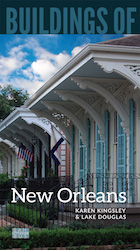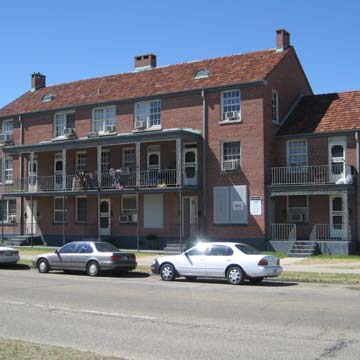Iberville was one of three low-income housing developments built in New Orleans shortly after passage of the U.S. Housing Act of 1937 and the subsequent formation of the Housing Authority of New Orleans, which supervised all low-income housing in the city. Iberville and the St. Thomas housing development (the latter demolished in 1999 for mixed-income housing called River Garden) were planned for white residents, and the C. J. Peete Housing (demolished in 2008; rebuilt as Magnolia Gardens) for African American residents, although all three eventually accommodated mostly African American families. Built on a 22-acre site, Iberville was planned for a population of approximately 2,000 to be housed in 858 apartments in 75 brick buildings. Construction was federally funded, requiring the use of durable materials. These substantial, nicely proportioned three-story brick buildings were designed to be in scale with the city’s houses, and each unit was provided with a front stoop or balcony, essential during the hot summers. However, the buildings’ uniformity of design, materials, and detail in a city that consists primarily of diverse styles of wooden houses made the developments stand out conspicuously. Furthermore, the elimination of through streets produced enclaves judged to be unsafe, and like much low-income housing across the nation, the buildings and the grounds were not adequately maintained.
Iberville was located on the site of Storyville, New Orleans’s notorious redlight district, where prostitution was legal until 1917. When the United States entered World War I, military authorities fearful of the spread of venereal disease pressured cities with large numbers of military personnel, including San Francisco, Boston, and Kansas City, to ban prostitution. Nevertheless, Storyville continued to operate illegally, although the area became increasingly blighted and, beginning in 1939, the large houses were razed and replaced by the Iberville Housing Development.
After Hurricane Katrina, federal housing officials decreed that most of the New Orleans housing developments would be demolished (a few buildings were retained), and new ones have been built in styles that mimic some generic nineteenth-century elements within a more suburban planning construct. This policy decision was not without national controversy, yet residents are enthusiastic about the new housing because it erased the negative connotations associated with these “projects.” The new community at the site of Iberville, Bienville Basin, was the last of the large New Orleans developments to be reconstructed. A far higher percentage of existing structures was retained, and the design has a greater connection to the city’s context as a result.















